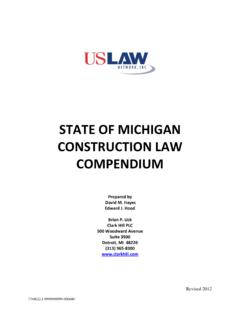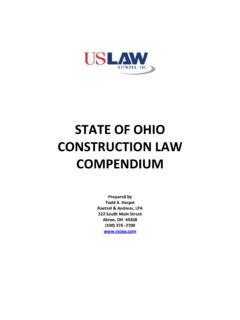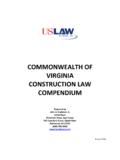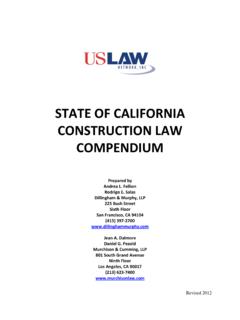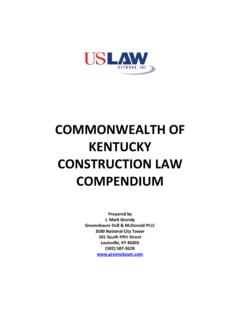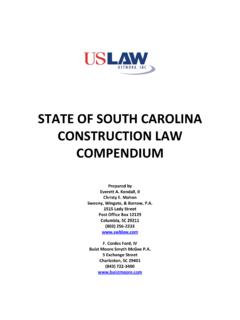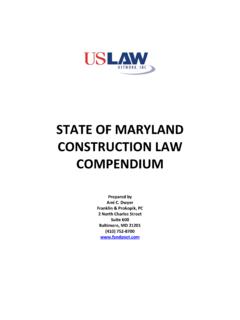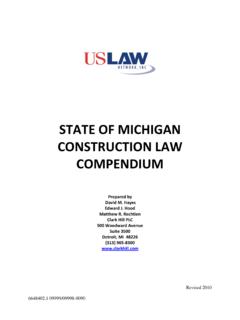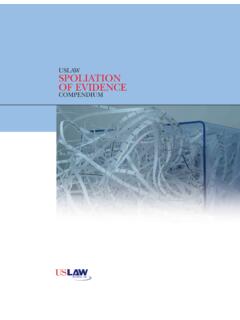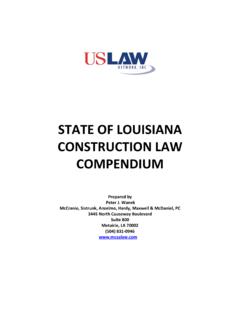Transcription of STATE OF TENNESSEE CONSTRUCTION LAW COMPENDIUM
1 STATE OF TENNESSEE CONSTRUCTION LAW COMPENDIUM Prepared by Lee Piovarcy Paul Morris Andrew Gardella Martin, Tate, Morrow & Marston, 6410 Poplar Avenue, Suite 1000 Memphis, TN 38119 (901) 522 9000 This outline provides a general overview of TENNESSEE s CONSTRUCTION law. The discussion on any particular topic is not necessarily an indication of the total law related to an area of TENNESSEE s CONSTRUCTION law. Most CONSTRUCTION disputes are governed by contract law. With a few variations, the law applicable to CONSTRUCTION disputes in TENNESSEE is similar to that found in other states . TENNESSEE is a comparative negligence/fault STATE . Comparative negligence in TENNESSEE is negligence on the part of the plaintiff that proximately contributed to his injuries.
2 This negligence on the part of the plaintiff does not bar his recovery from other negligent parties unless plaintiff is found to be 50% or more at fault. TENNESSEE abolished joint and several liability when it instituted comparative fault. McIntyre v. Balentine, 833 52, 58 (Tenn. 1992). The jury must apportion fault by percentage among all responsible parties. I. BREACH OF CONTRACT Typically a breach of contract claim can be asserted by the purchaser against the general contractor, as well as by the general contractor against its subcontractors. A general breach of contract claim in TENNESSEE is subject to a six year statute of limitations. T. C. A. 28-3-109 (1976). However, it is well settled in TENNESSEE that the three (3) year statue of limitations ( TENNESSEE Code Annotated 28-3-105) applies to claims for injuries to realty.
3 This is so regardless of whether the causes of actions set forth in the complaint are designated as an action for tort (negligence) or contract. To determine the nature of the cause of action the court will look to the gravamen of the complaint. Whaley v. Perkins, 197 665, 670 (Tenn. 2006). The three (3) year statue of limitations begins to run when the plaintiff first discovers that he has a cause of action ( that there is a problem with the residence). There is also a four (4) year statute of repose ( TENNESSEE Code Annotated 28-3-202) which provides that all claims related to improvements to property are barred if brought more than four (4) years after the date of substantial completion, regardless of when the alleged problems were discovered. A breach of contract gives rise to a cause of action by the aggrieved party.
4 The statute of limitations begins to run as of the date of the breach. It is also a well recognized rule that a cause of action arises when the acts and conduct of one party shows an intention to no longer be bound by the contract. Greene v. THGC, Inc., 915 809, 810 (Tenn. App. 1995). II. NEGLIGENCE Generally, an injury incurred due to negligent CONSTRUCTION may give rise to an action for breach of a contractor s duty of care, or negligence. An action for negligence in CONSTRUCTION could be based upon the contractor s poor workmanship, supervision, or design. The negligence claim against the general contractor may be limited by the economic loss rule. This rule, in TENNESSEE , bars a plaintiff from recovering under tort law. TENNESSEE has joined those jurisdictions which hold that product liability claims resulting in pure economic loss can be better resolved on theories other than negligence.
5 In TENNESSEE , the consumer does not have an action in tort for economic damages under strict liability. Ritter v. Custom Chemicides, Inc., 912 128, 133 (Tenn. 1995). Rather, when a product does not perform as expected, the 2 buyer's remedy should be governed by the rules of contract, which traditionally protect expectation interests. Id. III. BREACH OF WARRANTY In CONSTRUCTION cases, plaintiffs typically assert causes of action for breach of warranty. The breach of warranty can be based on express warranty provisions contained in the contract between the plaintiff and the general contractor and/or warranties implied by law. Tenn. Code Ann. 28-3-202 provides that all actions to recover damages for any deficiency in the design, planning, supervision, observation of CONSTRUCTION , or CONSTRUCTION of an improvement to real property, for injury to property, real or personal, arising out of any such deficiency, or for injury to the person or for wrongful death arising out of any such deficiency, shall be brought against any person performing or furnishing the design, planning, supervision, observation of CONSTRUCTION , CONSTRUCTION of, or land surveying in connection with, such an improvement within four (4) years after substantial completion of such an improvement.
6 This statute of repose will bar an action four years after substantial completion, regardless of when the plaintiff may have reasonably discovered the injury. The discovery rule, utilized to ascertain when a cause of action has accrued under a statute of limitations, does not toll the statute of repose. Chrisman v. Hill Home Development, Inc., 978 535, 539 (Tenn. 1998). TENNESSEE has an implied warranty of merchantability for goods under Tenn. Code Ann. 47-2-314. Further, the Court has aligned itself with those jurisdictions that recognize that the home buying public has a legitimate expectation that the workmanship and materials used by the builder-vendor in the CONSTRUCTION of a dwelling will meet the standard of the trade for homes in comparable locations and price range and that such a warranty is implicit in the contract and survives the passing of title to the real estate and the taking of possession, as an exception to the doctrine of caveat emptor.
7 Dixon v. Mountain City Const. Co., 632 538, 541 (Tenn. 1982). IV. MISREPRESENTATION AND FRAUD Under some circumstances general contractors can be sued by homeowners under the theory of fraud or misrepresentation. Tenn. Code Ann. 28-3-105 provides that actions for injuries to personal or real property shall be commenced within three years from the accrual of the cause of action. Northeast Knox Utility Dist. v. Stanfort Const. Co., 206 454, 459 (Tenn. Ct. App. 2006). This statute applies if the plaintiff alleges the builder is guilty of fraud in performing or furnishing the design, planning, supervision, observation of CONSTRUCTION , CONSTRUCTION of, or land surveying, in connection with such an improvement, or if the defendant shall wrongfully conceal any such cause of action.
8 Chrisman v. Hill Home Development, Inc., 978 535, 541 (Tenn. 1998). Fraudulent misrepresentation requires proof that (1) the defendants made false representation; (2) the plaintiff relied on the misrepresentation; and (3) the plaintiff suffered injury as a result of relying on the misrepresentation. Also a party to a contract has a duty to disclose to the other party any material fact affecting the essence of the subject matter of the contract, unless ordinary 3 diligence would have revealed the undisclosed fact. Lonning v. Jim Walter Homes, Inc.,725 682, 685 (Tenn. App. Ct. 1986). V. INDEMNITY CLAIMS: A. Express Indemnity: Express indemnity claims derive from contract provisions in which one party to the contract agrees to pay costs incurred by the other party to the contract as a result of the other party being held liable to at third party or having to defend against a claim filed by a third party.
9 TENNESSEE has consistently recognized that the right of parties to allocate liability for future damages through indemnity clauses, under most circumstances, is not contrary to public policy. Planters Gin Co. v. Federal Compress & Warehouse Co., Inc., 78 885, 892 (Tenn. 2002). However, TENNESSEE courts have found indemnity clauses are invalid as to damages caused by gross negligence or willful conduct on the part of the indemnified. Id. The TENNESSEE legislature has barred indemnity in certain cases involving CONSTRUCTION as against public policy. Where a covenant, promise, agreement or understanding in connection with a contract relating to the CONSTRUCTION , alteration, repair or maintenance of a building purporting to indemnify or hold harmless the promisee against liability for damages arising out of bodily injury to persons or damage to property resulting from the sole negligence of the promisee, the promisee's agents or employees, or indemnitee, is against public policy and is void and unenforceable.
10 Tenn. Code. Ann. 62-6-123 (1997). If one is to be indemnified for his/her own negligence, the indemnifying agreement must clearly and unequivocally so STATE . Summers Hardware and Supply Co., Inc. v. Steele., 794 358, 363 (Tenn. App. Ct. 1990). In TENNESSEE it is nearly a universal rule that there can be no recovery where there was concurrent negligence of both indemnitor and indemnitee unless the indemnity contract provides for indemnification in such case by clear and unequivocal terms; and general words will not be read as expressing such an intent. Kroger Co. v. Giem, 215 Tenn. 459, 472 ( ). B. Implied Indemnity: Implied indemnity is the theory holding there is an implied obligation to indemnity when the obligation is a necessary element of the parties' relationship, or when justice and fairness demand that the burden of paying for the loss be shifted to the party whose fault or responsibility is qualitatively different from the other parties.
